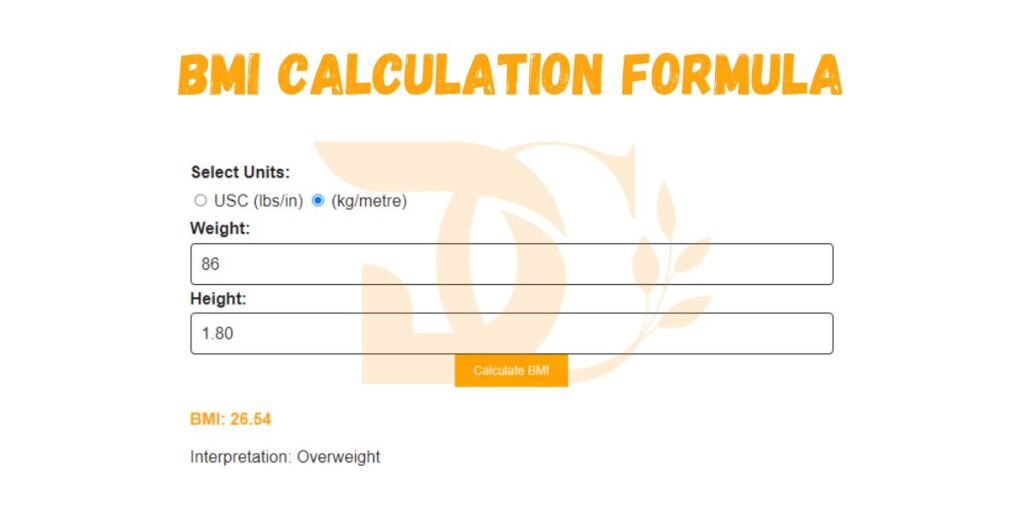Use this free BMI Calculation Formula to calculate your Body Mass Index
BMI Calculator


BMI Calculating Formula
Calculating your Body Mass Index (BMI) is a straightforward process that relies on an individual's height and weight. The formula for BMI is as follows:
Calculating Body Mass Index formula USC Units:
| BMI = 703 × | Mass (lbs) / Height2 (in) |
Use this BMI Calculation Formula For Metric Units:
| BMI = | mass (kg) / height2 (m) | |
To interpret BMI values:
- A BMI of 25.0 or above falls into the over-weight category.
- The healthy BMI range lies between 18.5 and 24.9.
- BMI calculations typically apply to most adults aged 18 to 65 years.
BMI Chart for Adults
Presented here is a visual representation of BMI categories derived from World Health Organization data. The dotted lines delineate subcategories within the overarching classifications.

BMI Calculation for Children
For youngsters aged 2 to 18 years old, the BMI calculator factors in age and gender in addition to height and weight.
A child's BMI is expressed as a "centile," which indicates how their BMI compares to other children of the same age and gender, presented as a percentage.
To illustrate, if a girl falls on the 75th percentile, she is heavier than 75 out of 100 other girls of her age.
BMI for children

If you have concerns about your child's weight, it is advisable to consult a GP. They may be able to direct you to a local healthy lifestyle program designed for children, young people, and families.
Risks Linked to Being Underweight
Underweight individuals face a range of associated risks, including:
- Malnutrition, vitamin deficiencies, and anemia can reduce the ability to transport oxygen in the blood.
- Osteoporosis, is a condition characterized by weakened bones, raising the likelihood of fractures.
- A weakened immune system makes the body more susceptible to infections and illnesses.
- Growth and development issues, particularly concerning children and adolescents.
- Possible reproductive problems for women, stemming from hormonal imbalances that can disrupt the menstrual cycle, with a higher likelihood of first-trimester miscarriages.
- Increased potential for complications following surgery.
- Generally elevated mortality risk when compared to individuals maintaining a healthy BMI.
Health Risks Associated with Excess Weight?
Carrying excess weight significantly elevates the risk of various severe diseases and health conditions. Below is a compilation of these risks, based on information from the Centers for Disease Control and Prevention (CDC):
- Elevated blood pressure.
- Increased levels of LDL cholesterol, commonly referred to as "bad cholesterol," reduced levels of HDL cholesterol, considered beneficial in moderation, and heightened triglyceride levels.
- Type II diabetes.
- Coronary heart disease.
- Stroke.
- Gallbladder disease.
- Osteoarthritis is a form of joint disease arising from the deterioration of joint cartilage.
- Sleep apnea and respiratory difficulties.
- Specific cancers include endometrial, breast, colon, kidney, gallbladder, and liver cancers.
- Reduced quality of life.
- Mental health disorders such as clinical depression, anxiety, and others.
- Physical discomfort and limitations in certain bodily functions.
- Generally heightened mortality risk when compared to individuals maintaining a healthy BMI.
Who Should Use BMI Calculation Formula
It's important to note that BMI is not suitable for specific groups, including:
- Muscle Builders: BMI doesn't differentiate between muscle and fat, only providing a numeric value. Individuals with substantial muscle mass, like athletes, may have a high BMI without necessarily facing greater health risks.
- Long-Distance Athletes: Athletes engaged in endurance sports may also exhibit higher BMIs due to their lean muscle mass, which doesn't necessarily imply health issues.
- Pregnant Women: During pregnancy and lactation, a woman's body composition undergoes significant changes. As a result, using BMI as an indicator of health is not appropriate during these phases.
- Young Children: Children who are still growing may not have completed their growth, impacting their BMI calculations. It's not a reliable measure for evaluating their health.
Who Shouldn't Use BMI Calculation Formula?
A BMI calculator may not be appropriate for certain groups, including individuals such as muscle builders, long-distance athletes, pregnant women, older people, or young children.
This limitation arises from BMI's exclusive reliance on numerical weight without considering the distinction between muscle and fat composition.
Athletes with substantial muscle mass might record a higher BMI without necessarily posing a greater health risk, while children in the midst of growth or older individuals experiencing muscle loss may display a lower BMI. Furthermore, it's worth noting that BMI may not provide accurate assessments during pregnancy and lactation due to the dynamic changes in a woman's body composition.

Conclusion:
In summary, while BMI offers a straightforward method for assessing body weight relative to height, it may not be suitable for everyone, particularly those in specific life stages or with distinct body compositions. Always consider individual circumstances and consult with a healthcare professional for a comprehensive assessment of health.

Leave a Reply